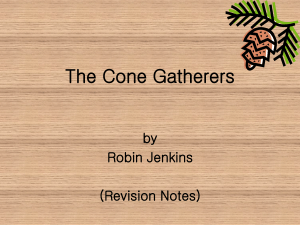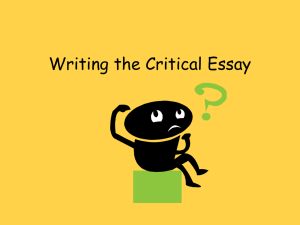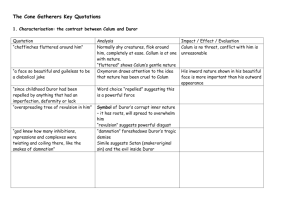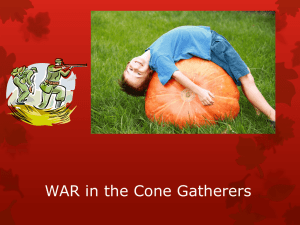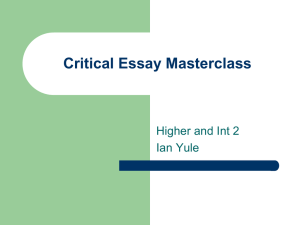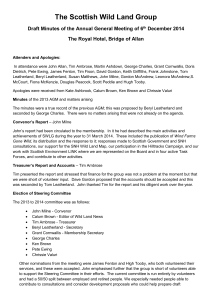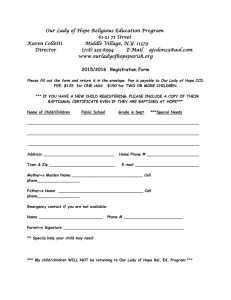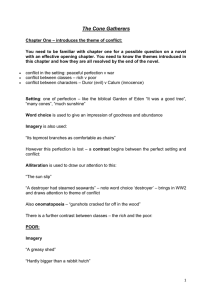the cone-gatherers - mrsbhigherenglish
advertisement
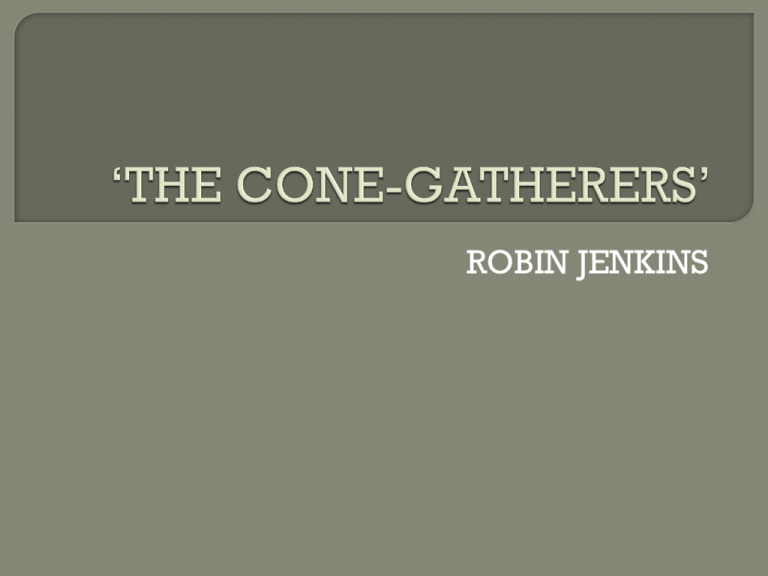
ROBIN JENKINS ‘The Cone-Gatherers’ by Robin Jenkins is set in Scotland during World War II. It is set on the estate of the Runcie-Campbell’s, a wealthy Scottish family. The action takes place over a few days in Autumn in the forest on the estate. The trees are to be cut down to provide wood for the war effort. The cones from the trees are to be collected before the forest is destroyed so that the trees can be replaced. Brothers Calum and Neil have been sent to do this hard, demanding work. The main themes that we will be studying are: Good versus Evil Class conflict War Jenkins cleverly uses imagery to convey depth of meaning below the surface: Trees Weather Seasons People In the opening chapter we are introduced to Calum and Neil who are high in the trees gathering cones. It is set during WWII and the forest is to be cut down for wood and needs to be replaced. Thus the reason for gathering cones. We also find out that Calum is very compassionate to animals and is very sensitive to their pain. He has released rabbits from their traps which angers Duror, the main character in the novel. The reader begins to learn of Duror’s shocking opinions. He hates the brothers, particularly Calum because of his deformity and wants him out of his wood. You will be given the context of various points in the novel and you must provide the textual reference (quote/evidence) and provide a comment (analysis) The theme of good v evil is developed in the opening chapter through: Setting The character of Calum The character of Duror From the top of the trees Calum and Neil can see a ship on the loch. ‘A destroyer steamed seawards, with a sailor singing cheerfully.’ P1 The reference to a destroyer reminds us that the novel is set during World War Two. Symbolically, perhaps the destroyer represents Duror, the sailor Calum, who is ‘singing’, oblivious of danger. The juxtaposition of the cheerful sailor and the warship hints at the coexistence of good and evil. Calum has a childlike innocence and an affinity with nature Calum cannot understand why animals kill each other He successfully blocks out the war The extent of Calum’s love of animals is realised when he sees a rabbit in distress Calum is skilled in carving – nature Description of the brothers The brothers foreshadow events Calum’s compassion for the rabbits angers Duror He vows to get rid of the brothers Duror spies on the brothers – his hatred revealed Duror thinks that his obsession with the brothers is a ‘noose of disgust’ – comment fully Shocking revelation from Duror’s childhood. His revulsion of anything imperfect stems fro childhood. There is an indication that Duror may act on his feelings of hatred He is obsessed with the brothers and cannot help spying on them Shockingly, Duror supports the Nazi regime He fanaticises about murder We become aware that the hared in Duror will not leave him without tragic consequences The brothers live in squalid conditions Neil is aware of the vast differences between them and the Runcie-Campbells He questions their living accommodation when there are more suitable, humane solutions Significance of the war – good versus evil, Duror, Calum The silver firs – class The cone-gatherer’s hut – class In chapter two we meet Dr. Matheson as Duror is walking home form the woods. He offers Duror a lift home, for which Duror is an inconvenience as he will have to make small talk with the doctor. The doctor seems to be more interested in the lack of food due to the war and is not at all happy about it as he is used to fine food such as venison and whiskey. Duror returns home to a desperately unhappy home life. His wife, Peggy, is morbidly overweight and is bedridden. We also meet the dour, hostile mother-inlaw Mrs Lochie. She blames Duror for her daughter’s misfortune and wants him to spend more time with her. We are of course, aware that Duror is repelled by anything that is deformed. Duror meets Dr. Matheson. We can tell he is not happy about having to talk to the doctor Duror’s wife Peggy is morbidly obese. Why is this so significant? When asked about Peggy he is compared to a tree. What does this tell us about his relationship? The doctor is suspicious that despite Duror’s stalwart and stoic appearance, something dark lurks in his mind The doctor admires Duror’s stoic nature Duror is desperately unhappy at home yet he hides his suffering Duror thinks of the cone-gatherer’s and how he is becoming obsessed Has Duror known than his sanity would, at one time, escape him? Duror wishes that he could be in the ‘miserable hut’ rather than be at home Mrs Lochie She, like Duror will never show Mrs Lochie is aware of, and not her suffering afraid to comment on, Duror’s dissatisfaction with his married life Duror Peggy likens Peggy with Calum Peggy happy and Duror were, at one time, Duror has a strong bond with his dogs His dogs then sense the inner turmoil in their master’s mind as he fantasises about thrashing them – he manages to regain control We first hear of the deer drive and the hatching of the evil plan to create immense suffering for the brothers At the end of the chapter Duror remarks ‘it too late’ and ‘as an infant separated from his mother in a great crowd’ – what does he mean? In this chapter we are introduced to Lady Runcie-Campbell’s rather clumsy son, Roderick. We are also introduced to his sister Sheila and their uncle Captain Forgan. It is in this chapter that Duror involves Mrs. Morton, the cook-housekeeper, and Lady RC in his plan to destroy the conegatherers. Roderick – a clumsy child Captain Forgan says he is envious of Duror’s life on the estate. However Duror would much rather be at war – note Duror’s bitterness Mrs Morton is used by Duror and becomes involved in his plot. She has shown no hostility towards the brothers Duror tells Mrs Morton that he saw Neil exposing himself in the woods and is a threat to young girls like Sheila Mrs Morton and Duror have feelings for each other but perhaps now Duror is incapable of love Duror admits to Mrs Morton that he needs help Day two – in a discussion with Lady RC, Duror suggests that Calum and Neil be used as beaters. She asks Mr Tulloch and he agrees that they can be used. However, he phones back to explain that Calum has scruples over being a beater. Lady RC asks Duror for advice and her Christian values are overcome by her aristocratic values. Later though she proposes a compromise – that only Neil be used. Duror will have none of it. Thus the fateful deer hunt is to go ahead. Lady Runcie Campbell struggles with her Christian Values, she should be compassionate to those less fortunate than her. However, her aristocratic status often contradicts this. The theme of class often explores this contradiction (note how she was so easily persuaded by Duror to make them stay in the hut) Lady cannot understand Roderick’s admiration for Neil Lady RC does not want the brothers near her home Tulloch explains Calum’s squeamishness to Lady RC and she refuses to understand (conflict between Christianity and class) CALUM Lady RC directly compares him to Christ Duror knows that his actions are wrong and will implicate Lady RC in his evil plan Imagery is used to convey the fact that he is aware he is overcome with evil (filth) Roderick’s dislike of Duror Duror considers another opportunity for evil – he imagines that Roderick has a terrible accident and dies He does not understand why he responded the way he did Imagery used to describe the terrible lies Another admission from Duror that he is totally aware of all the evil he is doing: Peggy, Mrs Morton, to destroy the CG’s In this chapter we learn of Neil’s worries over Calum. He is fearful of Calum’s fate should anything happen to him. Duror tries to climb the tree but suffers from dizziness. The brothers learn that they must take part in the deer hunt. Neil, furious on behalf of Calum, tells Duror that they are ‘free men’ and that they will not take part. Calum, out love for his brother, agrees to try his best to take part. The hut is a symbol of humiliation for Neil Neil is humble and believes that the RC’s represent the power of the world Evil Neil is aware of the hatred that Duror has for him and his brother but cannot understand it Lady Runcie-Campbell organises a deer hunt in honour of hr brother, Captain Forgan, who is on leave from serving in WWII. Neil is outraged on behalf of Calum that they have been asked to act a beaters. Neil insists that they do not take part. It is in this chapter that Duror reveals to others the psychological problems he has been experiencing. This chapter is a turning point for many reasons. Up to this point it has only been the reader who has been aware of the evil within Duror. At the deer hunt his deterioration is exploited publicly. It is also the point at which it is clear that the cone-gatherers will no longer be able to remain in the woods. Furthermore, after the deer hunt, we are to a large extent, shut off from Duror’s thoughts. We do not see him very often in the rest of the novel and often only through the eyes of other characters. Duror’s nightmare – he reveals his mental state to others Find examples and analyse (there are many) His plan to kill Calum is connected to the fact that he has come to hate his wife and longs to be rid of her Find examples and analyse Duror has repressed his feelings which is why he appears stoic and ‘stalwart’ Find examples and analyse Duror’s intense hatred of Calum continues to grow and it is shocking to the reader to discover that his evil plan to rid them form the wood is far from over (reference to Christ) Calum, with overwhelming sympathy for the deer flings himself upon the deer, regardless of his own safety Duror laughs like a madman He carries out the savage attack on the deer He askes for Peggy in a state of confusion He furiously attacks Calum It seems that both Duror and Lady RC blame Calum for the horrific events Duror’s misery returns with the realisation that his wife is not dead Lady Runcie-Campbell is horrified at the outcome of the deer hunt. She automatically blames Calum. However we also notice that Lady RuncieCampbell believes in the system of privilege and tries to make sure that her Christianity justifies it. It is in this chapter that we see Roderick and Mr Tulloch try to bridge the gap between lady RC and the cone-gatherers. Mr Tulloch and Captain Forgan mistake Duror’s motives for attacking Calum Explain this with reference to the text and analyse Lady RC sides with Duror in blaming Calum Find evidence and analyse Mr Tulloch is a decent man. He is fair and expects others, including Lady RC to be the same. Find evidence and analyse Roderick is also fair and he can see that unfairness in the treatment of the cone-gatherers. Find evidence and analyse The silver fir trees act as a barrier between the upper and lower classes. If the cones are not gathered, the trees will not be replaced after the war Discuss with close reference to the text (symbolism) Lady RC takes her children to the pictures. They meet Calum and Neil and Roderick suggests that they give them a lift back otherwise they will have to walk but Sheila strongly objects. Consider the views of Lady RC, Roderick, Sheila and Duror and their reaction to Roderick’s suggestion that they should be offered a lift home Duror returns from his consultation with Dr. Matheson Here we witness Duror's inner turmoil. This is how he really feels – he is a man on the brink, as his physical positioning at the edge of the pier highlights. The actions which he considers are not only brutal, but final. Furthermore, there is a direct contrast here between his outward appearance and his inner feelings. Duror “stared” at the water which would indicate that he is looking for himself, seeking an answer in his reflection. However, because it is night, he can see nothing below him but darkness. Thus there is no hope for him, no salvation. Duror appears to realise that he has reached the end. However the fact that he "halted" would suggest that he is unable to end his own suffering. Duror's longing for the end encourages sympathy from the reader. There is an inherent sadness here, and the realisation that death would be preferable to life is expressed through the use of the word "wish". The men in the pub feel a degree of sympathy for Duror’s predicament with Peggy. A soldier in the pub tells a joke about fighter pilot and an ape. We learn that the brother’s mother committed suicide after the birth of Calum. FIND EVIDENCE FROM THE TEXT Lady RC makes her usual visit to Peggy. The theme of class is exemplified by the behaviour of both women: Lady RC cannot stand Peggy’s ‘fawning’ manner while Peggy ‘simpers’ and fawns over her because she is an aristocrat. FIND EVIDENCE FORM THE TEXT Sir Colin has concerns about his son. He writes letters in which he wishes to be reassured about Roderick’s ‘manner of speaking…to the lower orders’. He believes that failure to adhere to the class structure would be ‘downright disastrous’. Roderick however admires the cone-gatherers and his desire to visit them after his mother would refused them a lift, makes his lie to her. Roderick in the wood – references to Christian in ‘The Pilgrim’s Progress’ a religious allegory FIND EVIDENCE FROM THE TEXT This ‘quest’ is very improtant to Roderick. He wishes to give them a ‘cake of friendship’ The cake should take the form of a reparation He thinks of the journey through the wood as a pilgrimage – imaginative He sees Duror and thinks of his as evil and wonders if he has gone mad. He wishes to protect the cone-gatherers from Duror Roderick feels frightened when he notices Duror – he feels defeated. FIND EVIDENCE FRON THE TEXT This incident is important because it reinforces: Social class/Neil’s bitterness Calum’s goodness Duror’s evil LRCs battle between Christianity and class Chapter starts with a storm approaching. This has two purposes, a literal and a figurative. Literally, storms are violent so the storm is a metaphor for violence. “…indigo clouds had been mustering” reflects early hints at inevitability of outcome whilst “black clouds were now overhead. Thunder snarled” pg 121 represents the growing animosity of Duror. It is an indication of what’s about to happen with Duror. “yet…peace and brightness persisted” pg 122 could be seen as Calum’s goodness – not yet extinguished or Roderick’s growing sense of justice and compassion for the men. Calum asks Neil if he saw the light – Calum asks if it is heaven ( this shows the extent of Calum’s innocence and Neil’s realism “there was no merciful god” pg 123.) This is relevant because Calum is about to be killed. Neil is lower down in the tree – partly because of his rheumatism and partly because Calum is a better climber. It also makes Calum nearer to death/God/heaven. Their individual disabilities make them more vulnerable in the face of the storm and the fact that “they were the only living creatures left in the treetops” pg 120 increases the isolation that they have been battling against since their first days on the estate. Their position is also representative of their vulnerability. They head for the beach hut Calum knows that they’re not allowed “the lady will be angry again” “this represented not only dryness and warmth but humanity”. This is another by-product of Duror’s evil. LRC WOULD have let the CGs have the beach hut but Duror talked her out of it. She has no idea about their living conditions BUT doesn’t care enough to find out herself. The storm itself is symbolic of LRC herself when she accosts them in a violent and uncontrollable fury The phrase “for God’s sake” is loaded with heavy irony – she is behaving in the most unchristian way. Her anger suggests that she is not only fighting for her property BUT her place in, and the survival of, the social system. When Calum says that Neil was only helping him keep dry she says “For Christ sake.” She has so much Christianity that she will not even let them be dry. p 130 “Your father’s right. After this war, the lower orders are going to be frightfully presumptuous”. This shows what Lady Runcie Campbell is like. She is scared she will lose her position. She doesn’t think that the working class should have any rights. There are various points emphasising the gulf of wealth between Lady Runcie Campbell and Neil and Calum e.g. toys broken being replaced. Neil knows Calum would pick the toy, which is broken, because it is disfigured like him. It is a human figure – feels it might be hurt. Calum’s inherent goodness is shown once more through his initial apprehension and reluctance to enter the hut, and his desire to protect Neil and take the blame for their “astonishing impudence”. The toys are a physical representation of Neil’s resentments of the RCs. The broken toys represent their carelessness and easy disregard for others. Lady RC goes mad when she sees that Neil and Calum have a fire going Neil is ashamed and doesn’t speak up “a lifetime of frightened submissiveness held it down”. This shows their lack of control over the social system in which they live. Neil’s inability to raise his head is symbolic of the class system and social prejudice that holds him down. They laugh at Calum because he can’t get his coat on. Sheila doesn’t recognise how wrong it is – she humiliates them. Roderick recognises his mother doing wrong again. It is Calum and Neil’s fire but Lady Runcie Campbell is getting the benefits. This is a metaphor – the working class do all the work but the higher classes get the benefits. Roderick’s face is described as ‘grave and tense’ following his mother’s outburst His mother is anxious about his ‘oversensitive conscience’ Lady RC remembers Duror’s treatment of Peggy and decides to talk to him about pity. The focus in the chapter is Neil makes a phone call to on Mr Tulloch Mr Tulloch after the encounter with Lady RC Tulloch makes an appointment to come and investigate the incident Neil wishes he and Calum be taken away from the forest Tulloch is kind and understanding Brothers will be replaced Neil demands an apology from Lady RC in person Find evidence and explain it in detail for the following points: Lady RC did not make the incident in the beach hut sound as offensive as she would have liked when she reported it to Tulloch Tulloch consulted his wife about it – biblical reference Neil’s appearance shocks Tulloch He admires Neil’s patience and determination Tulloch is unpatronising and listens to Neil – beach hut, Lendrick Neil’s distress is very real Comment fully on the question Neil asks Tulloch – ‘why is it…that the innocent have always to be sacrificed?’ Tulloch tries to explain Lady RC’s reaction in the beach hut – class Neil rejects this Tulloch states he will tell Lady RC the CGs will be replaced with conscientious objectors but because of her status she must be disgusted by them all because of the code she lives by – ruling class Tulloch shows kindness and understanding to the brothers Comment on the last line of the chapter “in none of her many rooms…. The one where she sought them most was Roderick’s.” There are two clear points in this line. She has many rooms while Neil and Calum live in a one-room hut – this is a contrast Lady RC is worried about Roderick. This is a contrast with the way she threw Neil and Calum out into the rain. She sees him as a fragile flower. She is a “practical Christian” – she can’t admit wrong. A practical Christian is someone who is Christian when they want to be. Her Christianity is valid as long as it supports what she does. She goes against a fundamental Christian ethic. P 141 This speech makes Lady Runcie Campbell into a caricature. The speech is about her attitude to her land, “angry and frustrated” – she is like a child having a tantrum. There is an irony that she is arrogant and overbearing. She doesn’t want to be treated equal to other people – she wants things to stay the way they are. “inferiority” – This idea is fundamental to Lady Runcie Campbell. She is superior to everyone else – the others are subhuman. She has “civilised bases” keeping her in place. “patronising” “condescending” – It is far more condescending to presume how they are going to react. She wants to perpetuate her superiority – she does this by treating them inferiorly When Roderick expresses the fact that he doesn’t know – another reference to war – it changed the way society worked. A lot of the arguments that she is coming out with are similar to Nazi arguments. Her privilege is inherited and not based on any sort of work. It is to do with birth – same as Nazi beliefs that you had to be born blue-eyed etc. Jenkins wants to show us that her attitude causes what happens at the end. She has the doctor see Roderick. “I’m going to ……gone” – her attitude is that they are so inferior that they make the wood ugly. Lady Runcie Campbell does not have a lot of selfknowledge. At the end of the Chapter “it is ….involved”. At the beginning we are reminded of her wealth and then at the end we are told she is reminded through a memory that we are all brothers in God. By being born we are all involved. This shows that she cannot say she is not involved in what is to come. For much of the chapter she has gone on about how superior she is. Yet she doesn’t really seem to have listened to what her father was saying – she says that she got her Christianity from her father. There is also a reminder that she is partly responsible for what is about to happen. The doctor came from an ordinary working class background – He cares no more for Roderick than he would for any other son. He is polite enough not to ask why he was called when there is nothing wrong. The doctor is not flattered at being called out by her. The point of the doctor being in the story is that he is everything that she finds inferior but we can see that he is superior to her. This is a contrast with the pretend superiority that Lady Runcie Campbell has. “Bosom……..shameful” the implication of the conversation between Lady Runcie Campbell, Duror and Tulloch is that of sexual implications. Lady Runcie Campbell doesn’t see the doll as innocent. When Tulloch asks for the doll for his daughter she sees the doll as obscene. Tulloch knows that Calum would have made a leg for the doll – biblical allusion of the cripple who couldn’t walk. Tulloch says that Duror is ill. If Lady Runcie Campbell has to admit that Calum and Neil have been treated badly then she has to admit that she treated them badly. It shows Calum innocent personality as he purely sees the doll as a broken toy with no sexual implications that Duror has spread rumours about. We see Duror dressed very ruggedly and is ill mannered. His shameful appearance shows the image of mind as well. His mind has become very deluded and has taken every opportunity to make the cone gatherers life’s a living hell. At the beginning of the chapter we discover that Calum and Neil have gone to a rocky promontory (a point of land that juts out into the sea). It is rocky because there is an allusion towards Christ’s crucifixion – it is at the top of a hill-where Christ was killed. “ Seeing his reflection, he grinned in appreciation at the jokes made about his face: its flatness, high cheekbones, narrow eyes and yellowish tan … reference to the Chinese” When we go to the big house we get a description of Mr Tulloch. We discover that his wife berates people when they insult him because he looks Chinese (the enemy during WWII). The first reason for putting this in is to show that people are seen as inferior because of how they look. Jenkins is saying that you can insult anyone but it is what the person is like that is important. The last thing that Calum says is “Cheerio sand the little man.” Calum is singing like an angel. This person is innocent, he is someone we shouldn’t wish any harm. Roderick looks for Calum and Neil because he wants to apologise – he wants to be an equal. Roderick wants to be absolved of his sins – religious references. He is sad when he discovers that they are leaving. Tulloch tells Roderick not to go near them – he doesn’t want to cause any friction. Roderick shows an interest in the cones etc. This shows that Roderick has an interest in the cone gatherers. This also shows that even ‘inferior’ people have expertise. In their jobs Neil and Calum are the best – they have superiority. The author brings up the thought that Roderick doesn’t like climbing trees yet this is an irony because at the end of the novel he wants to be like the cone gatherers and so goes up the tree and gets stuck. He does this because he wants to appreciate what the cone gatherers do. Lady Runcie Campbell wants Neil and Calum out of the wood – Neil and Calum want out. Tulloch asks if they can stay till Saturday. She grants it. If he had mentioned the incident at the beach hut she would have been in the position to either admit she was wrong or admit that she wasn’t really Christian. Instead of Neil and Calum he is going to send conscientious objectors – they are deformed in mind rather than body (Calum). Lady Runcie Campbell has to take these people. Tulloch doesn’t hate conscientious objectors – he says that they are not cowards. Tulloch is reminding us that we cannot condemn people because we don’t think the same as them. Tulloch also makes the point that his wife and men disliked them at first but eventually they saw them for what they were – it was the same with Calum. This is what Lady Runcie Campbell fails to do. Duror suddenly appears when Lady RC and Tulloch are talking – note his description – no dogs, no gun, dirty, dishevelled He has with him the doll which now becomes ‘obscene’ Tulloch explains that Calum would only have mended its leg and that he had carved a squirrel for his own daughter However the mood is destroyed when Duror rambles hoarsely to Lady RC, making accusations of the foulest kind against Calum Duror keeps repeating the word ‘seed’ Lady RC is absolutely horrified by this out burst and asks Duror if he has gone mad He is sent away to continue his work The Ending The ending is important because we learn about: Lady Runcie Campbell’s realisation Duror’s final decline, outcome of evil Calum’s murder (culmination of Christ allegory- personification of GOOD) The results of social class Setting – links back to warships etc Also promontory is now tainted forever. Could be argued that it has a ‘happy’ ending Roderick climbs the tree – he admires the cone gatherers – he cannot get down LRC acts calmly and decisively At one point however she turns on Harry as she thinks he implied cowardice (extreme insult in aristocratic society) She needs the cone gatherer’s help but Neil demands she ask herself She is appalled at the idea but decides to go It is she who finds Calum’s body She goes down on her knees amoung the blood and cones She cannot pray but she can weep As she weeps pity and joy and hope well up in her heart The fact she decided to go to the cone gatherers is a great concession for her The ending shows she has learnt a lesson about rank and Christianity Graham tells Duror that the CGs refused to help Roderick – Duror walks of in their direction without speaking Graham tells LRC about Neil and Duror – LRC goes in search of the CGs – she hears a gun shot She hears another shot and knows that Duror has killed himself Evil appears to triumph over good but Duror cannot live with the emptiness that is left – evil destroys itself
